A lot of formative mid 20th century science fiction and fantasy stories are full of straight shooters. Heinleinian men’s men, kill-you-if-you-look-at-him-funny Conan and his literary progeny, and even Aragorn only goes by the mysterious “Strider” persona for, what, a chapter? I love a lot of the stories featuring those kinds of heroes, but have always been drawn more toward liars, spies, charlatans, and intriguers.
What better way for a reader to learn about a fictional world than through characters who try to manipulate and change that world’s rules? And what better source of suspense and tension than a protagonist constantly forced to lie?
So then, here are five books featuring lies and espionage on a national (or intergalactic) scale.
Judgment Night by C. L. Moore
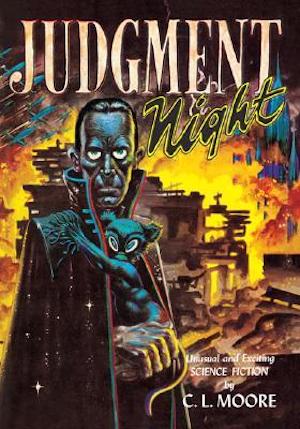
Moore’s novella begins with a sort of meet cute: Juille, the princess of a galactic empire, is incognito on a pleasure planet, where she meets Egide, the similarly incognito leader of the space barbarians (yes, space barbarians) at her father’s proverbial gates. Their dance of will-they-or-won’t-they-topple-each-other’s-domains twists through double crosses, divine audiences, and the use of ancient superweapons, but the book ends by asking why a galactic empire should even continue to exist.
On the way to that conclusion, we get lots of the wonderfully sumptuous “golden age” prose that, for my money, Moore was the best at (“the ship came to a velvety stop”); worldbuilding that’s all bound up in deep time and impossible scale; and a female lead who’s tough, complex, and sympathetic, while not being a good person by most metrics.
Hard to Be a God by Boris and Arkady Strugatsky
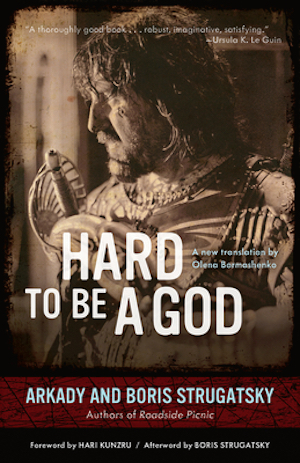
At first, the Strugatsky brothers wanted to write a fun adventure, which they described as “our spy on an alien planet,” as part of their Noon Universe: a post-scarcity future where communism has won. Then the Soviet Union had an unexpected backlash against the “wrong” kinds of art, which felt, at the time, like a return to Stalinism after the Thaw. The shock of it changed the Strugatsky brothers’ outlook considerably.
Boris described the feeling in the afterword to the 2014 edition: “We shouldn’t have illusions. We shouldn’t have hopes for a brighter future. We were being governed by goons and enemies of culture.” So, Hard to Be a God became the darkest “prime directive” Trek episode ever.
Our hero(?) Anton is doing the old “observe but don’t interfere” thing on a planet whose humanlike inhabitants live in what is, essentially, medieval Europe. According to the Noon Universe’s idea of progress, this planet should’ve had its enlightenment and begun to improve, but it just… didn’t. So Anton is stuck watching fascism bloom in a filthy and violent place; he has the knowledge and power to topple local despots, but his position as an undercover agent forbids it. His mission is to let their history develop “naturally,” but he begins to wonder whether it would really be so terrible to meddle.
The Vor Game by Lois McMaster Bujold

It was tough to pick the best Vorkosigan book for this list—the whole series is wonderful, and each entry has its own unique composition of political intrigue, spycraft, and good old confidence tricks. In The Warrior’s Apprentice, for example, Miles Vorkosigan cons his way into commanding an entire fleet of mercenary spaceships.
But The Vor Game probably sports the most balanced mix of outer space merc shenanigans and political intrigue. In doing so, it also further explores Miles’ home planet of Barrayar, (one of my absolute favorite sci-fi settings) a regressive monarchy that was suddenly thrust into interplanetary prominence just a few generations earlier.
The Vor Game is where Miles—fast-talking, physically fragile, both a privileged noble and a denigrated outsider—actually joins the arm of Barrayar’s military that handles covert operations. He’s then sent offworld, with a false identity, on a spy mission that soon comes to involve his mercenary fleet. The mercenaries, of course, know him by yet another false identity.
Dragon by Steven Brust
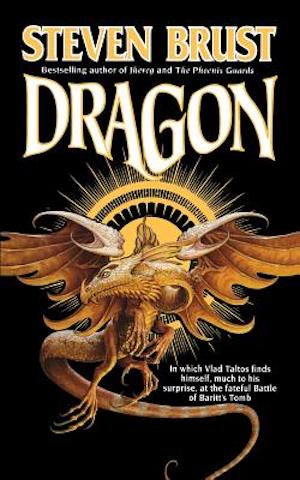
This, on the other hand, was an easy choice. Over the years, Brust’s antihero Vlad Taltos has been involved in a lot of espionage and trickery, but in the eighth book we get that epic fantasy classic: a war.
The beauty of Dragon is how petty, small, muddy, and unimportant that war is. Vlad, the supremely competent assassin and sometimes mafia boss, has to pretend to be a normal foot soldier in order to get close to an enemy. He’s utterly out of his element: uncomfortable, bored, and terrified. As the story wraps up, it expertly combines the satisfaction of a plot well-executed with dark satire and just a touch of sadness at such a useless loss of life.
All this is told in Brust’s spare and almost Hammett-like first person prose, which describes epic fantasy figures and eldritch magic weapons as though they’re everyday nuisances.
The Unbroken by C. L. Clark
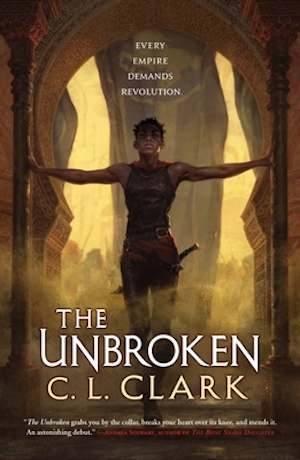
Much like the other C. L. on this list, Clark’s debut concerns the work of maintaining an empire. The book begins as military fantasy, showing the lives of soldiers who were plucked from conquered states as children and raised in the Balladairan imperial center, and who, as adults, now themselves occupy one of the empire’s colonial territories.
But then even the known discomforts of colonial military life are stripped from Touraine, who’s pulled into intrigue (and dance parties) on behalf of a royal who’s trying to work with local rebels to improve the empire. The question being, of course, whether such an institution deserves to be improved, and therefore kept around, at all.
We don’t have an answer yet, but I’m looking forward to the next book very much.
Buy the Book
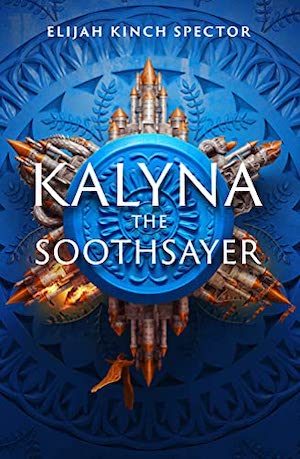

Kalyna the Soothsayer
Elijah Kinch Spector lives in Brooklyn. Kalyna the Soothsayer is his first novel.











I’ve got to pitch “The Stainless Steel Rat’s Revenge” here. I know it isn’t serious but the comedy value of Slippery Jim DiGriz infiltrating a planet’s army, when said planet has managed to do the impossible and make interstellar conquest work, is a gem in my view.
There’s an otherwise forgettable novel from long long ago–The Man in the Graysuit? I think–which had an amusing bit about the guys who get sent in before the James Bond characters to set things up so the International Man of Mystery stuff doesn’t just produce a dead International Man of Mystery.
On of my favorites from recent years was Amberlough, by Lara Elena Donnelly. It’s like Le Carre meets the musical Cabaret, but set in an alternate universe.
How can you skip Tim Powers’ Declare? It covers pretty much the whole of the 20th century from Lawrence of Arabia to the Cold War, plus Ifrit! One of my all-time favorite books.
Oh yes, Declare is incredibly brilliant. And what about Keith Laumer’s Retief books, and Poul Anderson’s Flandry of Terra?
Nice! My great-aunt is first in this list!!! Such an amazing writer, I’m happy to see her remembered.
Charles Stross’ Laundry series is all about spies and espionage (at least for the first few books anyway)
I think he first got the idea from reading Tim Powers Declare
Another major vote for Declare, one of my favorite books. I reread it every couple years.
Wasp , by Eric Frank Russell
Along with @5, I’m surprised at the absence of Poul Anderson’s Dominic Flandry & Keith Laumer’s Jame Retief (although, technically, Retief was a diplomat rather than a spy). Both are huge favorites of mine.
I first ran into Flandry in Earthman, Go Home!, which was half of an Ace Double in 1960. The cover for that side featured great Emsh art. I was hooked, and this was before I saw Dr. No 1st run and became an espionage fanatic. I bought both Chilton collections when they came out. It is not implausible to think that Flandry, rather than James Bond, got me into espionage.
My first encounter with Jame Retief was in Envoy to New Worlds, ALSO half of an Ace Double, this one published in 1963. It was also enhanced by great Emsh cover art. By then, I was already heavy, heavy into my espionage phase, which saw me eventually reading hundreds of espionage books by dozens of authors. Good SF/espionage mashups were the Holy Grail.
In addition to the great, and better known, Aleksey German Russian film adaptation of Hard to Be a God, there is a 1989 German version starring Klaus Kinski, of all people. The German language version is on You Tube with English subtitles (autogenerated). You have to click on the CC to turn them on. You can also watch the German version (Amazon incorrectly says it is in Russian) on Prime for 99 cents. As of the last time that I watched it, the You Tube print did not have any ads.